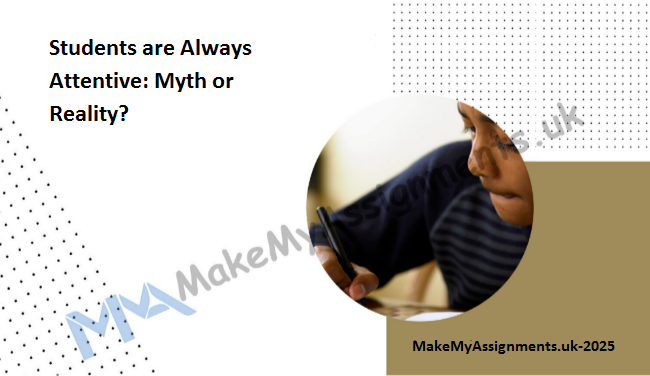Let’s be honest — not everyone has the time (or patience) to spend hours writing…

Students are Always Attentive: Myth or Reality?
The idea that students are always attentive is a common belief among many parents and teachers. However, the reality is quite different. While students do have the ability to focus, their attentiveness often depends on several factors such as interest in the subject, teaching style, and their personal mindset. It is essential to understand the reasons why students may or may not be attentive and how educators can enhance their engagement in the classroom.

The Nature of Student Attention
Students are naturally curious beings. When something interests them, they can give their full attention without any distractions. However, it is unrealistic to expect that they will always be attentive in every class, regardless of the subject. The human brain is not designed to focus on one thing continuously for extended periods without breaks. This is why students often find their minds wandering during long lectures or monotonous lessons.
Some subjects naturally excite students more than others. A student passionate about science might struggle to stay attentive during a history lecture, while another who loves literature may find math classes dull. It is not that students do not want to pay attention; rather, their level of engagement varies based on their interests and the way the material is presented.
The Role of Teachers in Maintaining Attention
Teachers play a significant role in maintaining student attentiveness. A boring lecture filled with monotonous explanations is likely to make students lose focus. However, an engaging and interactive lesson can keep them involved. Teaching methods that include storytelling, real-life examples, and practical applications tend to capture students’ attention more effectively.
Additionally, the use of technology in classrooms has become a powerful tool to maintain students’ focus. Videos, interactive quizzes, and digital learning platforms help create a dynamic learning environment that keeps students engaged. When students find lessons interesting and relevant, they are more likely to stay attentive.
External Factors Affecting Attention
Many external factors influence a student’s attentiveness. Lack of sleep, hunger, stress, and personal issues can greatly impact their ability to concentrate. A student who didn’t get enough rest the previous night is likely to struggle to stay focused in class. Similarly, a student dealing with personal problems may find it hard to pay attention to lessons.
Classroom environment also plays a role. A noisy and chaotic classroom makes it difficult for students to concentrate, while a well-organized and calm setting encourages better focus. Teachers and schools should aim to create an environment that minimizes distractions and fosters a learning-friendly atmosphere.
The Need for Breaks
One common mistake in traditional education is expecting students to sit through long hours of continuous learning without breaks. Research suggests that taking short breaks improves attention and retention of information. Schools that incorporate short breaks or physical activities between lessons often notice improved student engagement.
While students have the ability to be attentive, it is unrealistic to expect them to always maintain full focus in every class. Attention depends on multiple factors, including the subject matter, teaching methods, personal interest, and external conditions. Instead of blaming students for lack of attentiveness, educators should strive to create engaging and interactive lessons that capture their interest. A flexible and student-friendly approach to teaching can help ensure that students remain more focused and involved in their learning journey.
After all, no one can be attentive all the time, not even teachers!




This Post Has 0 Comments